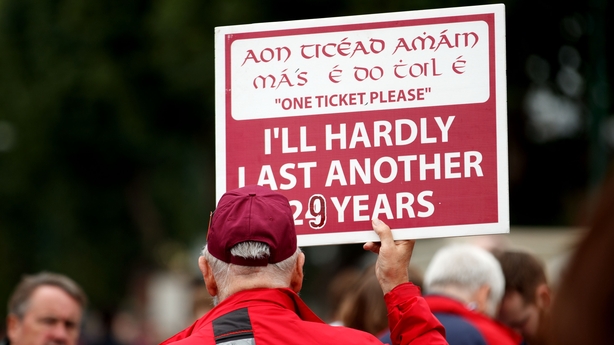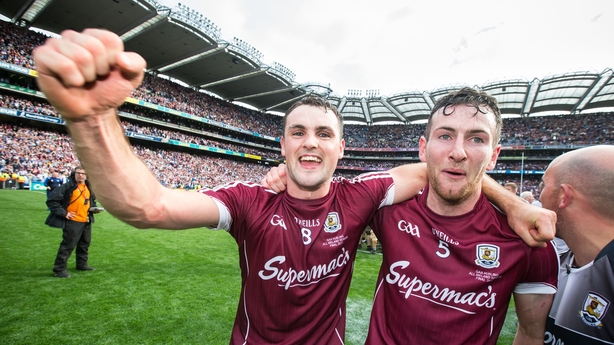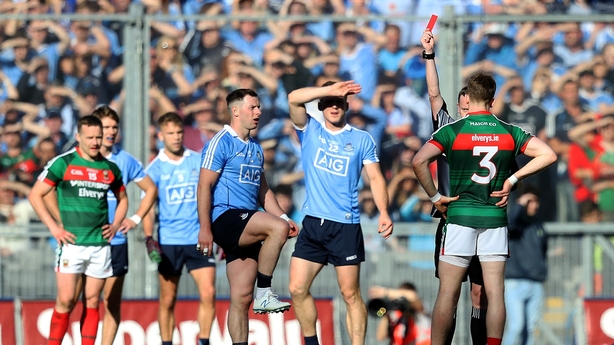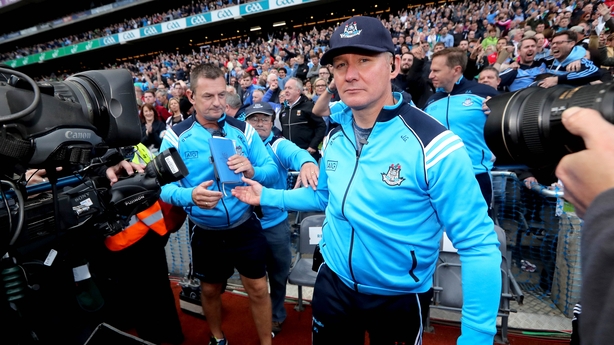Before the 2016 All-Ireland hurling final, RTÉ produced a promo celebrating the 'first Sunday of September', a date long associated with the biggest day in the hurling calendar.
Included was the scramble for tickets on Jones's Road, the crowds landing on the platform at Heuston Station, the sweating barmen of Drumcondra pulling pints at a hundred miles an hour.
Ironically, this loving promo was produced at a time when that tradition itself was under review.
There have been modest tweaks to the championship calendar before.
Between 1997 and 2005, the hurling final was actually played on the second Sunday of September, as the GAA began their slow drift away from the straight knockout format. Alterations were made to restore the old September schedule from 2006 onwards.
But the finals were always in September until now. Driven by the desire to free up more space for club fixtures, Congress voted to move the All-Ireland football and hurling finals to August beginning next year.
In 2018, the Eucharistic Congress will stall the move to August for the football final for another year. That will, for one year only, reside in the previously sacred space reserved for the hurling showpiece, the first Sunday of September.
Compared to the radical changes to the hurling championship format, the switch to August All-Ireland finals cleared the 60% threshold with some ease, achieving the support of 78% of the delegates.
The change was relegated to the secondary slot on the sport news agenda underneath the adoption of the more divisive Super 8 format.
By the time September rolled around this year, and the realisation dawned that this was the final year of the old championship calendar, there was a nagging sense that the decision to move the All-Ireland finals had been taken too lightly and after too breezy a debate.
Speaking to RTÉ Sport in November, Colm O'Rourke said that the GAA had made an error in ceding the month to their sporting rivals, pointing out that the hurling and Gaelic football would no longer occupy the media's attention for the month of September.
For the next few years, the championship season will wind up earlier than usual, during the average family's holiday season. The provincial finals in both codes will be done and dusted by the first Sunday of July.
Early summer will be noticeably hurling heavy as the round-robin provincial fixtures are run off. After the provinces are finished, football will take over in July and August as the Super 8 format gets going.
The last September hurling final - for a few years at least - gave us a unique pairing. Galway and Waterford, two of the most tortured members of hurling's elite, met in the senior final for the first time in history.
From the moment Austin Gleeson shovelled the ball to the net late in the Cork-Waterford All-Ireland semi-final, it was clear that a long Liam MacCarthy famine would end in 2017.
Just in case you weren't in the All-Ireland mood yet, here's a little teaser ahead of tomorrow's clash between Galway and Waterford. pic.twitter.com/zMzm0s61tA
— RTÉ Sport (@RTEsport) September 2, 2017
Galway were last champions in 1988 and turned up in finals in a semi-regular basis in the years since. They had collected a welter of silverware at underage level since 1990.
This success failed to translate to senior level so often that recent minor victories have tended to elicit only eye-rolls from the wider hurling community.
If Galway's famine tested their supporters' nerves, then Waterford's was of a whole other order. That barren run stretched back to the pre-television era.
Eamon De Valera had only just called it a day as Taoiseach and taken up residence in the Phoenix Park when Waterford last lifted Liam MacCarthy back in 1959.
The ticket hunt was suitably ravenous and unusually stressful. On the day of the 2016 All-Ireland hurling final, this writer - a neutral - turned over in his bed at 11.30am and idly texted his friend's brother to ask if there were any tickets going.
Within 30 seconds the response came that there was and did he want one. The obvious assumption was that there were enough Tipperary and Kilkenny supporters who were relaxed about missing this one All-Ireland final. Sure, there'd be another one along soon enough.
No such ease in 2017. On the morning of the game, Dorset Street resembled the arrivals lounge at Dublin airport with people holding aloft pieces of cardboard with messages scrawled on them.
'LOOKING FOR 2 MATCH TICKETS - TERRACE OR STAND'
Outside the Croke Park Hotel, panicked individuals spent the morning and early afternoon with their mobile phone stuck in one ear, their finger jammed in the other to block out the din, trying to source a last-minute ticket for a relative or a friend.

Waterford appearances in All-Ireland finals were too infrequent for them to be blase about missing out, while Galway fans, one suspected, did not want to miss a final that they knew in their hearts they were going to win.
The last September hurling final wasn't a classic in the mould of 1997 or 2014 but nor was it a drab stinker like 1996 or 2008.
Galway fans, scarred after witnessing previous failures, could have been forgiven a sense of foreboding at half-time. Their forwards were in scintillating form early on, whipping nine points from play from nine attempts in the first 13 minutes.
And still they only led by a point after conceding two sucker-punch goals against the run of play. The second, in particular, was a freakish event which might have sparked alarm bells in the more fatalistic and superstitious of the Galway support.
Waterford were less fluid in their play but they hung in the game and poked their nose in front in the third quarter. That was the cue for Galway to rattle off four points on the bounce, a period in which the eventual Man of the Match, David Burke, was noticeably influential.
For the remainder of the game, Galway's lead hovered between one point and four points but they always maintained an advantage. While their starting cast of forwards were more subdued in the second half, their replacements came up trumps with both Niall Burke and Jason Flynn popping over crucial scores late on.
A dispassionate neutral reading suggested that the Connacht men were likely winners from a fair way out but history taught the westerners not to relax until they were awarded that final sideline cut deep in stoppage time.
A wall of noise preceded Joe Canning's cut as the crowd realised the famine was about to end. The outpouring of emotion, both inside Croke Park and back in Galway, in the days that followed was comparable to 1980.
Captain David Burke remembered Tony Keady and Niall Donoghue on the steps of the Hogan.

If the hurling final was suffused with novelty, the football final presented us with the latest instalment of a long-running saga.
After failing to land the League title for the first time in the Jim Gavin era, there were tentative suggestions that the Dubs might be more vulnerable in 2017.
By September, it was clear that the spring lapse was simply a byproduct of their desire to peak later in the season and they entered the decider carrying an even greater air of invincibility than usual.
Their demolition of a hitherto promising Tyrone team in the semi-final sparked fresh panic about their superiority vis-a-vis the rest.
Mayo lost to Galway in Connacht for the second year running and looked like an old dog on its last legs during their anxious run through the qualifiers. They recovered their old selves in the quarter-final replay against Roscommon and carried that exuberant form into the semi-final against Kerry.
As is standard for this match-up, the ticket scramble was ferocious, though no members of Seanad Éireann went public about their disenfranchisement this time.
Mayo and Sam. Is it all in the mind? #RTEgaa #DUBvMAYO pic.twitter.com/kFnyEdIBnk
— RTÉ Sport (@RTEsport) September 17, 2017
So conditioned are we by feel-good sporting movies that it feels wrong that Mayo haven't scooped their holy grail yet. Surely God above would have baulked at the sight of this long-running torture by now and re-arranged fate accordingly.
But no, he's left well alone and Mayo proceeded to lose their ninth All-Ireland final in 29 years. Incredibly, they've lost close to a third of the past 30 All-Ireland finals. This is said nearly every year but this one felt like the most excruciating of the lot.
Mayo, with Andy Moran hitting the form of his life in his mid-thirties, clearly unsettled the Dubs in the opening half. Several of Stephen Cluxton's kick-outs found Mayo hands and 25 minutes in, Jason Sherlock had to scamper around behind the Canal End goal to whisper an urgent message to his goalkeeper.
Neither Ciaran Kilkenny nor Paddy Andrews - touted as Man of the Match contenders beforehand - made any significant contribution, though they did somehow earn a free for bumping into one another on the stroke of half-time.
Mayo's Chris Barrett executed so many turnovers and that even non-statisticians began taking note. Galway hurler Padraig Kelly was the last player from a losing team to win All-Ireland final Man of the Match back in 1993.
He'll probably hold that distinction forever given the televisual necessity of choosing a player from the snazzy winners banquet. But Barrett must have come close to joining him.
John Small received a second yellow card for knocking over Colm Boyle on 50 minutes. Unfortunately for the underdogs, Donal Vaughan's moral outrage was such that he went barrelling into Small in retaliation. The Ballymun player, understandably, didn't need much encouragement to hit the deck. Both players headed for the line.

Other Dublin players came to the fore, most noticeably James McCarthy in midfield.
Diarmuid Connolly, getting his first proper run since his controversial suspension in June, was introduced at half-time and gave a poised performance in the half-forward line.
After Lee Keegan's goal, the Connacht side led by two points inside the final ten minutes and, as Tony Blair's soundbite peddler might say, the hand of history lay on their shoulder.
He opted to hand-trip them instead with points from play from Mannion, McCarthy and Rock reeling them in, before Rock would win the game with a late late free.
If necessity be the mother of invention, then in Gaelic football terms, desperation is the mother of cynicism. And both sides broke new ground in the field of cynical play late on.
Keegan tossed a GPS monitor at Rock as he wound up to take the final free, not something Tipp's Hell's Kitchen ever thought of doing even at their most snarling.
The Dubs, for their part, ensured that Mayo wouldn't get a shot at equalising with an unashamedly frank bout of 'synchronised fouling' as David Clarke shaped up to take his final kickout.
Jim Gavin and Dublin completed the three-in-a-row, the first team to do so since the ageing Kerry team of 1984-86. Statistically, they have confirmed their supremacy over the beloved Dublin side of the '70s.

They lost the 2015 Footballer of the Year Jack McCaffrey in the opening minutes and still had enough nous and enough quality to reach the final whistle in the lead.
While the rest of the country frets about the competitive balance of the football championship and the All-Ireland series going the way of the Leinster, Dublin continue to serenely career on ahead.
Next year, they look to the equal the Kerry golden era side of 78-81 and claim four titles in a row.
The modern-day Kings of September could soon be crowned the Kings of August.
